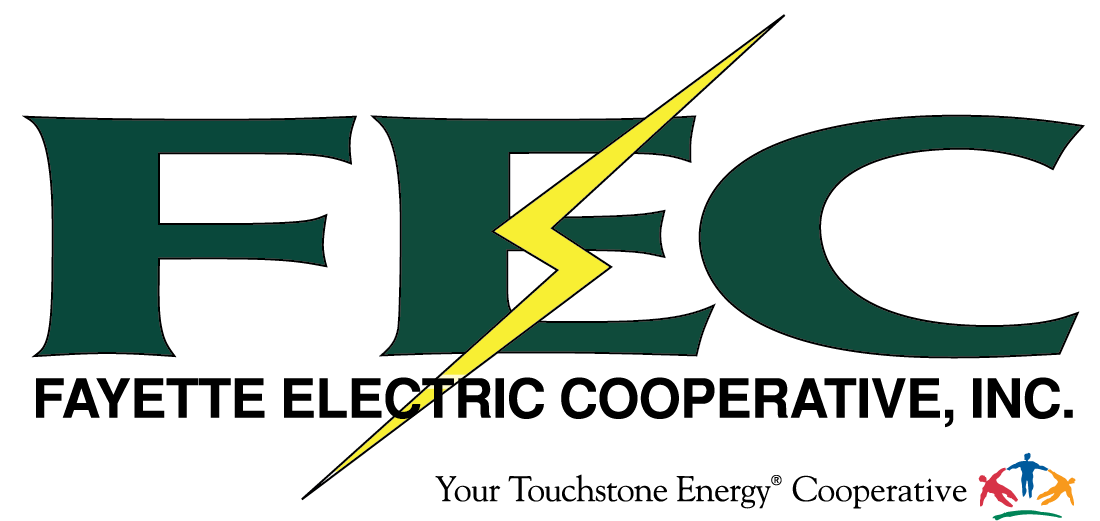May is National Strawberry Month and National Barbecue Month. Yum! While both of those observances sound incredibly delicious and worth celebrating with our taste buds, there are also more serious observances this month, including Electrical Safety Month.
Electricity can be extremely dangerous but is often out of sight, out of mind.
“While you can see, smell, or hear some electrical hazards — outlets that are warm to the touch or lights that constantly flicker, for example — many others are invisible and undetectable,” says Gary Don Nietsche, general manager of Fayette Electric Cooperative. “Always respect electricity and the potential danger that comes with its distribution and use.”
Nietsche says there are precautions you can take both inside and outside your home when it comes to possible electrical dangers. “When outside, always be aware of overhead power line locations and never come within 10 feet of a line — for example, while trimming trees or carrying a tall ladder or other far-reaching object,” he advises. “Also, if you see a downed power line near your home or in your travels, always assume it is live (energized) and NEVER go near one.”
Fayette Electric Co-op offers these other electrical safety tips:
- Cell phones make strange bedfellows: Do not sleep or lounge in bed with a cell phone or other device that is charging: This can cause burns to your skin or it can cause the soft bedding materials to ignite.
- Do not use cheap chargers: Instead, use the original charging components that came with your cell phone or other electronics. When it comes time to replace them, spend a little extra to buy brand-specific chargers and cubes. Using cheaply made generic chargers with your electronics can cause injury (shock/burns) or even a fire since they may be defective.
- Charging devices and water don’t mix: Do not use a plugged in (charging) cell phone near water. Take a break from your phone while bathing, swimming or sitting in a hot tub. Deaths have occurred when a plugged-in cell phone has fallen into water. DO NOT use plugged in items near water.
- Do not overload outlets or circuits. While it can be tempting to plug in several items in one outlet or on one circuit, drawing too much power can damage your electronics or your home’s wiring, or cause more serious problems such as a fire. If too much current is drawn, usually a circuit breaker would trip or fuses would blow, but this is never guaranteed.
- Test your GFCI buttons once a month: Put a reminder in your phone or mark it on your calendar each month. GFCIs help prevent ground faults that can shock or injure you, but they can’t do their job if they are not working properly.
- Do not ignore odd electrical symptoms in your home. If your lights flicker often, if your outlets are warm to the touch or appear discolored, or if you smell odors like something is overheating but can’t determine where the odors are coming from, there may be problems with your home’s electricals. There might also be a problem if your circuits or fuses need to be tripped or changed often. If you notice any of these symptoms or other unusual electrical oddities in your home, consult a qualified electrician.
- Make sure your home is protected with AFCIs, which stands for arc fault circuit interrupters. When there is an arc fault, it means that an electrical source in your home is malfunctioning. When that happens, an arc (intense heat or light) can be discharged. Because of that, AFCIs are required by National Electric Code since they help prevent home fires. Have a professional electrician assess your home to make sure AFCIs are installed, especially if your home is older.
- Include electrical sources when baby- or childproofing your home. There are many electrical components that toddlers and children can tamper with, such as exposed outlets, dangling cords, and accessible power strips or surge protectors. Be aware of potential electrical dangers throughout the home by getting down on the floor and seeing what is at eye level or within reach. Tamper-resistant outlets became required by the NEC (National Electric Code) in 2008; many homes built before then do not have them.
“Safety is a top priority at Fayette Electric Cooperative, and a responsibility we take seriously. At work or play, we want our members to know that it always pays to practice electric safety rules,” Nietsche added.

